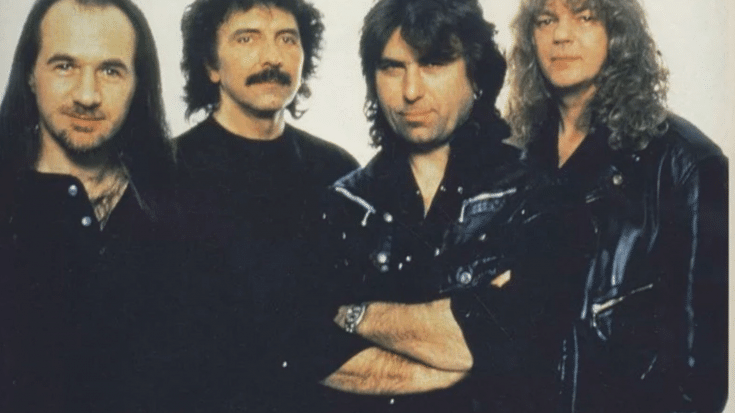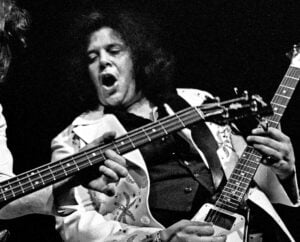10 Disappointing Albums by Otherwise Great Rock Bands

via Israel Pereira / YouTube
Every great rock band has its peaks and valleys. Fans cling to the high notes of chart-topping hits and iconic performances, but even the best bands can miss the mark. For various reasons—be it clashing creative visions, personal turmoil, or a bid to experiment—some albums do not resonate. They fall flat, fading into the shadow of a band’s otherwise stellar discography. This list delves into ten such albums, where rock legends missed a step and delivered works that left fans and critics scratching their heads.
10. Van Halen – Van Halen III (1998)
Van Halen only ever released one album with Extreme singer Gary Cherone, and you only have to listen to it to find out why. It was so bad they didn’t release another record for 14 years. The most withering review came from the band’s original singer David Lee Roth, who opined that the Eddie Van Halen-sung “How Many Say I” sounded like “hot water being poured on a cat”.
9. The Who – It’s Hard (1982)
The Who’s legacy as British rock royalty is unassailable, known for their explosive live shows and groundbreaking albums. But 1982’s “It’s Hard” signaled a band out of sync with the times and themselves. The loss of drummer Keith Moon in 1978 left a void that the band struggled to fill, both musically and emotionally. This album, lacking the fire and insight of their earlier work, showed a band unsure if they still wanted to make music together. It’s a reflection of a legendary group facing their twilight, trying to find their place in a rapidly changing music scene.
8. Black Sabbath – Forbidden (1995)
Black Sabbath’s pioneering heavy metal sound has inspired countless bands. Yet, their 1995 album “Forbidden” is often remembered as a misstep. The decision to collaborate with rapper Ice-T and bring in producer Ernie C from Body Count was meant to be innovative. Instead, it clashed with the band’s foundational sound, creating a disjointed album that fans and band members alike have disowned. Tony Iommi, Sabbath’s legendary guitarist, has been openly critical of the effort, acknowledging it as a low point in their storied career.
7. Kiss – Carnival of Souls: The Final Sessions (1997)
Kiss has always embraced change, reinventing themselves visually and musically over the decades. “Carnival of Souls: The Final Sessions” was an attempt to adapt to the grunge era, an awkward pivot for the band known for their flamboyant rock anthems and theatrical performances. Initially shelved, the album was later released to fulfill contractual obligations, revealing a band caught between their classic sound and a desire to stay relevant. The result was an album that satisfied neither the grunge audience nor the Kiss Army, standing as a curious anomaly in their catalog.
6. Led Zeppelin – Presence (1976)
Led Zeppelin, at their best, were unrivaled, crafting songs that defined rock music. However, “Presence” emerged during a tumultuous period for the band, particularly for singer Robert Plant, who was recuperating from a serious car accident. This album, thrown together in a haze of pain and pressure, lacks the depth and daring of Zeppelin’s earlier work. It’s often seen as the beginning of the end for the band, a product of fatigue rather than inspiration, signaling a legendary act grappling with its own mortality.
5. Genesis – Calling All Stations (1997)
Genesis transitioned from progressive rock pioneers to pop stalwarts through the ’70s and ’80s. However, the departure of Phil Collins in 1996 left a void that “Calling All Stations,” with new lead singer Ray Wilson, couldn’t fill. This album, marred by an unclear direction and forgettable songs, failed to resonate with fans and critics. It’s an example of a band trying to find its footing in a new era without its most recognizable voice, resulting in a project that feels disconnected from the Genesis legacy.
4. The Clash – Cut The Crap (1985)
The Clash were known as the “only band that matters,” thanks to their mixture of punk energy and political insight. Their final album, “Cut The Crap,” was anything but essential. Following the departure of key members, the band was a shadow of its former self. The album veered away from their punk roots without finding a new direction, leaving fans confused and disappointed. It’s an inglorious end to a band that had once stood at the forefront of musical rebellion.
3. Metallica – St Anger (2003)
Metallica’s “St Anger” was a departure that confused many fans. Recorded during a tumultuous time for the band, the album stripped away solos and introduced a raw, unpolished sound. The snare drum, in particular, received widespread criticism for its tinny quality. “St Anger” showed a band trying to redefine itself, struggling with personal issues and experimenting with its sound. While it has its defenders, many see it as a misfire in Metallica’s illustrious career.
2. Chris Cornell – Scream (2009)
Chris Cornell was revered for his role in pioneering the grunge movement with Soundgarden. His solo work explored various musical territories, but 2009’s “Scream” was a radical departure. Embracing pop and electronic beats produced by Timbaland, Cornell alienated many of his rock fans. The album’s lack of guitars and reliance on synth sounds was seen as a misstep for an artist whose voice had defined a genre. “Scream” stands as a curious side note in an otherwise celebrated career.
1. Duran Duran – Thank You (1995)
Duran Duran were icons of the ’80s, combining new wave energy with a polished image. Their 1995 covers album “Thank You,” however, is often cited as one of their least impactful projects. Attempting to pay homage to their influences, the execution fell flat, turning timeless classics into lackluster imitations. Particularly jarring was their take on Public Enemy’s “911 is a Joke,” which felt utterly disconnected from the band’s strengths. It showed a band out of its depth, turning what was meant to be a tribute into a misadventure.













